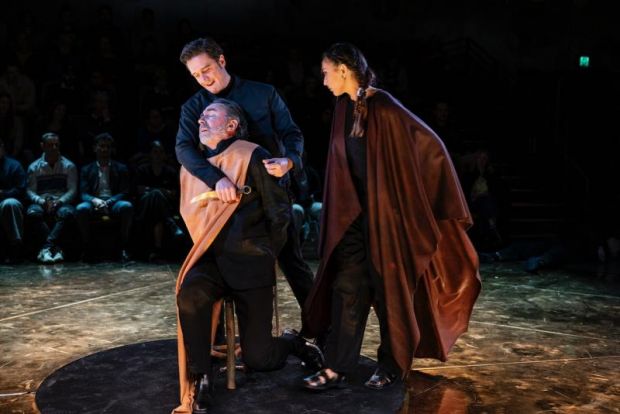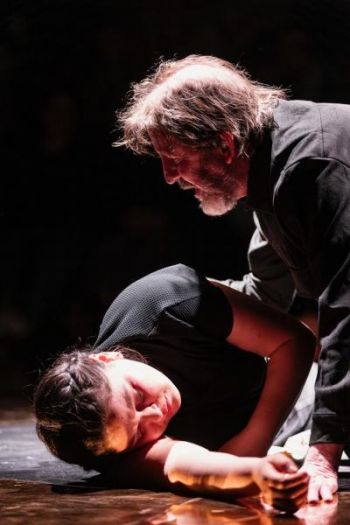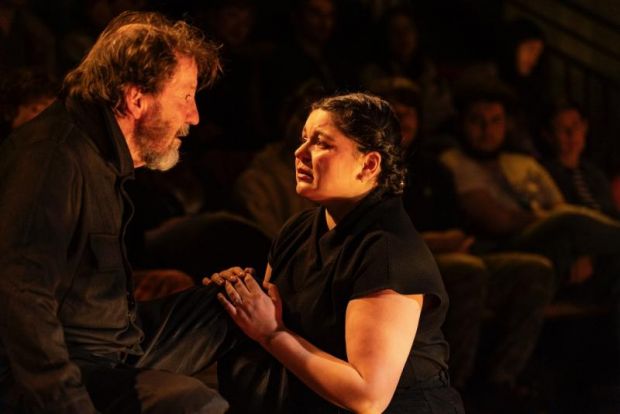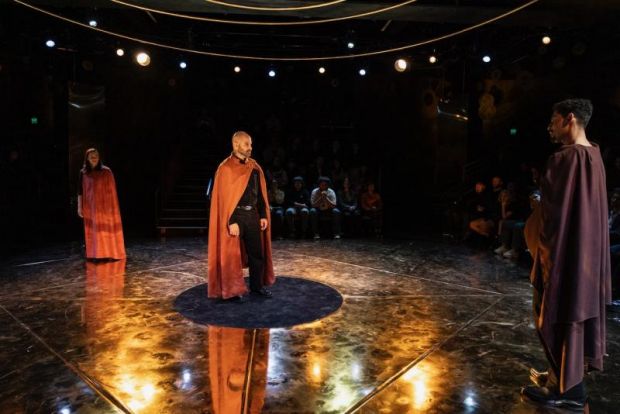King Lear
When old King Lear asks his three daughters, ‘Which of you shall we say doth love us most?’ an audible ripple, a gasp or a groan, runs through the theatre. ‘Oh-oh,’ we think, ‘here we go.’ There is a feeling of dread as well as anticipation. How will we be shown them this time? Because most of us know the consequences and now they are set in train. We know there will be jealousy, lies, murder, torture, death and madness. Why does King Lear (Robert Menzies) ask that foolish question? Vanity? Or is he, authority undermined, already on the path to dementia? Here we see that daughter Regan (Tamara Lee Bailey) knows her father all too well – the sad old fool - she plays the game with a knowing smile and practically winks at the audience. More solemn Goneril (Lizzie Schebesta) plays her fulsome nonsense straight-faced – which makes it even sillier. But Cordelia (Melissa Khahraman) – does she seem a little too self-righteous here? – tells the truth and is punished for it.

So Shakespeare sets his mighty engine running. Edmund (Darius Williams), the illegitimate son of Gloucester (James Lugton) is already in place as schemer and catalyst, bent on getting his place in the sun. Director Peter Evans and his cast point up Shakespeare’s ‘hair splitting’ and our ambivalence. There is no softening of the melodrama, but it plays alongside insight and ambiguity. There is comedy in the reveals. Edmund – so obsequious to everyone, but so confident in his villainy - is in both senses a bastard, but he has his reasons; he takes us into his confidence, and don’t we feel a surge of sympathy when he cries, ‘Now, gods, stand up for bastards!’? Darius Williams plays him with clarity and glittering cynicism, but played that way, don’t we want him to succeed, well, a bit? Especially when legitimate son, Edgar (Alex King) is so credulous and a bit wet? Regan tears out Gloucester’s eye, but Tamara Lee Bailey gives her a seductive charm – the perfect mate for Edmund. Don’t we tend to agree with the hard-hearted sisters when they tell Menzies’ almost childish Lear (‘reason not the need’) that an entourage of a hundred roistering knight is too much? The Fool (also Melissa Khahraman) makes the most accurate evaluations of Lear’s state, but Lear stares at the floor, sunk in dazed self-pity, and ignores her.
 Do we feel pity or horror when Lear in his fury calls for the destruction of the world? And then he can only see clearly how the world works when he is mad but continues to believe that the source of every misery can only be ungrateful daughters. Menzies gives the emphasis to pathos rather than regal power brought down and humbled. Lear, we gather (and so does he, eventually) was a bad king, only holding on to power through tradition – but so secure that he thinks he can give away all responsibility and keep all the privileges – even though fearing madness as he learns that isn’t so. Menzies’ subtle performance gives us a Lear on the edge of panic, begging that he not be made mad - and thus creates a terrible tension as he foreshadows Lear’s madness well before Lear is buffeted by the storm.
Do we feel pity or horror when Lear in his fury calls for the destruction of the world? And then he can only see clearly how the world works when he is mad but continues to believe that the source of every misery can only be ungrateful daughters. Menzies gives the emphasis to pathos rather than regal power brought down and humbled. Lear, we gather (and so does he, eventually) was a bad king, only holding on to power through tradition – but so secure that he thinks he can give away all responsibility and keep all the privileges – even though fearing madness as he learns that isn’t so. Menzies’ subtle performance gives us a Lear on the edge of panic, begging that he not be made mad - and thus creates a terrible tension as he foreshadows Lear’s madness well before Lear is buffeted by the storm.
Anna Tregloan’s set is sumptuous, palatial, but totally but bare marble, backed by long sheets of metal that punctuate scenes and create the thunder of the storm on the heath. Benjamin Cisterne’s lighting reinforces the drama and the passions – as does Max Lyandvert’s sound scape, which knows when to add and when to be silent. When Gloucester is blinded, we watch in full light, but the storm is scudding clouds and lightening. Lear’s fear of madness sees him isolated in a pool of light surrounded by darkness…
There are, nevertheless, infelicities here. Some of the cast do have trouble with the verse and their diction and speeches are sometimes lost. There are two instances of cross-gender casting. Alex King as Edgar is clarity itself, and her androgenous persona (at least here) gives nuance to the character. But I am puzzled by Janine Watson as Kent. I mean no disrespect to her: she has a powerful stage presence; her delivery is sharp and precise. But I cannot help but see Kent as a crusty old campaigner, a fearless brawler, the same age as Lear and with an almost irrational loyalty to him. What did Peter Evans seek to say or to show us with his casting decision here? (It’s not the first time I’ve seen Kent played by a woman and it was as puzzling – and distracting – there as here.)

But this production, running for a total of two hours and twenty-five minutes, does not flag. Shakespeare’s text (pruned somewhat by dramaturg James Evans) is beautifully structured, and Peter Evans keeps it moving between plot and sub-plots with economy and agility. Evans says he is often asked for the relevance of Shakespeare’s plays for today. Here, and forcefully, we see that power per se can persist only through ruthless violence - or until overcome by goodness. We see that sanity is fragile and that it can be easily lost when its supporting delusions are shattered. That seems relevant enough.

No matter how many times I see this play on stage or on film, Shakespeare’s writing of the scenes on the heath, when the mad man talks to the blind man, or at the end, when Lear weeps over Cordelia, move me to tears. With these performances and this production, it is the same. With its variety of characters, its heart-wrenching drama and themes, it is surely one of the greatest plays of all times.
Michael Brindley
Photographer: Brett Boardman
Subscribe to our E-Newsletter, buy our latest print edition or find a Performing Arts book at Book Nook.
